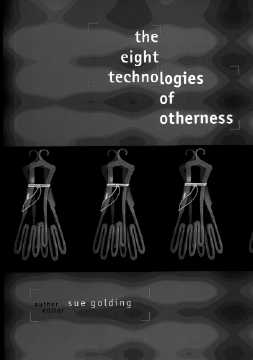Eight Technologies of Otherness
Charlie Gere reviews Sue Golding's The Eight Technologies of Otherness, Ed. (Routledge £16.99)
 What are we to do when, as Sue Golding puts it, "this erstwhile thing called 'political philosophy' turns strange"? When the politics of identity centres upon a tired 'shopping list' of 'other' identities? One possibility is to "stop sterilising the wounds" ‚to take up anew the question of otherness and bear witness to those everyday practices by which it confers meaning.
What are we to do when, as Sue Golding puts it, "this erstwhile thing called 'political philosophy' turns strange"? When the politics of identity centres upon a tired 'shopping list' of 'other' identities? One possibility is to "stop sterilising the wounds" ‚to take up anew the question of otherness and bear witness to those everyday practices by which it confers meaning.
In The Eight Technologies of Otherness, Golding takes this disrupted and disruptive location as her starting point. Recruiting the Foucauldian notion of technology and, beside her own contributions, work from thirty-three artists, philosophers, film-makers, writers, photographers, political militants and 'pulp-theory' practitioners, she offers a typology of strategies by which otherness is negotiated in the everyday. For each of the eight, 'curiosity, noise, cruelty, appetite, skin, nomadism, contamination and dwelling', several works evidence the (im)possibilities of their employment, conscious or otherwise, to "make meaning stick".
Golding's own 'Curiosity' works well to set the field for what follows, employing early Nietzsche and Wittgenstein's Mathematics against the reductivities of Hegel's dialectics to achieve "an ethical position with no morals". In 'Noise', Hans A. Scheirl and Allucquére Rosanne Stone engage performatively and analytically with cyberspace discourse and cyborg living to ask after the making of meaning "not what things mean, but how". 'Appetite' moves through sucking and fucking to deep democracy. Paul Gilroy's sensitive, powerful traverse from the murder of Stephen Lawrence to the specious ontologies of race marks the centre point of 'Skin', while others explore transgendering and transgression.
'Contamination' contains some of the work's weightiest content. Vron Ware broaches 'The White Issue', placing neo-fascist proclamations beside the banalities of Ralph Lauren's 1996 paint catalogue ("thirty-five shades of white [...] [w]hite is absolutely in this year..."). In "On the Names of God" Ernesto Laclau engages with Eckhart to consider the signification of the absolute, mysticism, politics and ethics. William Haver asks: "what if queer research were to be something other than a banal reproduction of academic [...] business as usual?" Finally, 'Dwelling' begins with Clive Van Den Berg's personal, political and historical contemplation of Johannesburg and his own public art, while Golding converses with Jeffrey Weeks about gay identity, community and diaspora.
Resisting reductive speculation by offering clever juxtapositions and a simple invitation to witness, this work belies its own achievement. Sue Golding's phenomenological/curatorial facility for presenting her subjects, diversity and ambiguity intact, at times suggests itself as a vital ninth technology. Her "Word of Warning" resonates throughout The Eight Technologies to make us again bear witness, this time newly acquainted with our 'peculiar moment', to a much needed rejoinder to the complicities and contentedness of postmodernism.
Mute Books Orders
For Mute Books distribution contact Anagram Books
contact@anagrambooks.com
For online purchases visit anagrambooks.com







